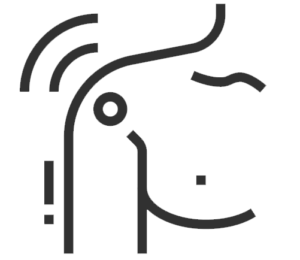Common Shoulder Conditions we treat:



Shoulder Pain
Did you know your shoulders are the most mobile joint in our body?
This mobility is great for throwing to reaching the top of the cupboards. However they can also be vulnerable to injury and repetitive strains, especially as we age. Sometimes we can identify a specific accident that caused our shoulder pain, sometimes it may be from a repetitive daily activity. Whatever the reason, it prevents us from fully enjoying our day.
Our shoulder is comprised of our humerus (arm bone) that is connected by four rotator cuff muscles – these are important in holding our humerus in place as we move our arm. Often times, when one of these rotator cuff muscles are injured, the other three have to compensate and work overtime to stabilize your arm. This can result in loss of strength, limited range of motion or general stiffness in the shoulder.
Symptoms:
• Pain in the shoulder joint – in back or front of the shoulder
• Restricted movement in the shoulder or arm
• Pain when moving the shoulder or arm, especially overhead movements
• Weakness or tingling in the arm
When to see a Clinician:
If you have noticed an increase in pain or weakness, find daily activities more difficult or finding the pain affected your sleep. It may be time to see a chiropractor, physiotherapist or registered massage therapist to have you moving and feeling better.
What treatment to Expect:
• We want to hear your story – this gives us clues to any triggers to avoid and identifies positions of relief which will help your recovery
• A thorough physical examination to identify your shoulder range of motion and limitations
• Together, we will create a treatment plan that works around your schedule and needs. This plan may include a mixture of deep muscle therapy, acupuncture, joint mobilizations and prescriptive rehabilitation to get you back to moving and feeling better.
Frozen Shoulder
We often get asked this question a lot – Do I have frozen shoulder?
Frozen shoulder is when the shoulder joint becomes stiff and painful, making it difficult to move the arms and complete daily tasks. Inflammation of the tendons, ligaments and the capsule may lead to
stiffness and adhesions in the shoulder joint. This condition is known to start slowly but it gradually gets more intense over time – so it is important to get it checked by a professional sooner rather than later.
Symptoms:
• Pain with movement of the shoulder and arm
• Limited range of motion – especially the inability to raise your arm
• Shoulder feels and becomes more stiff
• Weakness in the arm
When to see a Clinician:
If you have noticed difficulty with reaching for the top shelf, putting on your seatbelt or worsening shoulder mobility with or without pain, it may be time to see a chiropractor or physiotherapist to assess your shoulder and determine if you have frozen shoulder.
What treatment to Expect:
• We want to hear your story – this gives us clues to any triggers to avoid and identifies positions of relief which will help your recovery
• A thorough physical examination to identify your shoulder range of motion and limitations
• Together, we will create a treatment plan that works around your schedule and needs. This plan may include a mixture of deep muscle therapy, acupuncture, joint mobilizations and prescriptive rehabilitation to get you back to moving and feeling better.
Rotator Cuff Injuries
Did you know your shoulders are the most mobile joint in our body?
Our shoulder is comprised of our humerus (arm bone)
that is connected by four rotator cuff muscles – these are important in holding our humerus in place as we move our arm. Often, when one of these rotator cuff muscles are injured, either from a fall, accident or sudden jerk, the other three have to compensate and work overtime to stabilize your arm. This can result in loss of strength, limited range of motion or general stiffness in the shoulder.
Symptoms:
• Pain with overhead movements
• Limited range of motion with the shoulder
• Difficulty or pain sleeping on shoulder
• Pain or tenderness when reaching, especially behind your back
• Weakness or numbness in arm
When to see a Clinician:
If you have noticed difficulty with reaching for the top shelf, putting on your seatbelt or worsening shoulder mobility with or without pain, it may be time to see a chiropractor or physiotherapist to assess your shoulder and determine the cause.
What treatment to Expect:
• We want to hear your story – this gives us clues to any triggers to avoid and identifies positions of relief which will help your recovery
• A thorough physical examination to identify your shoulder range of motion and painful areas
• Together, we will create a treatment plan that works around your schedule and needs. This plan may include a mixture of deep muscle therapy, acupuncture, joint mobilizations and prescriptive rehabilitation to get you back to moving and feeling better.


